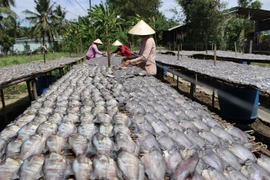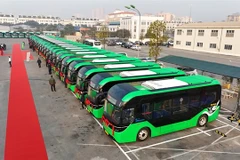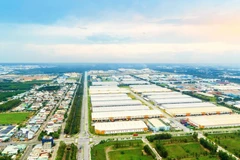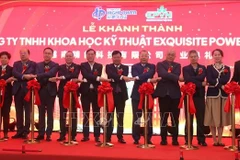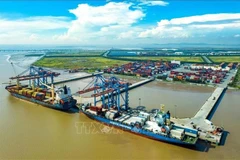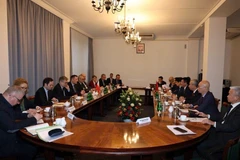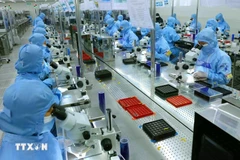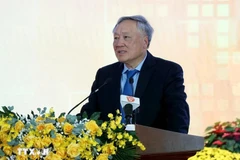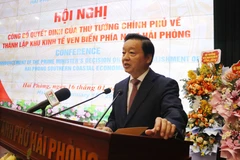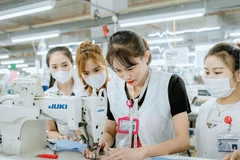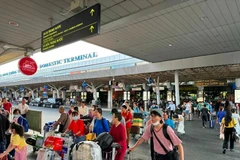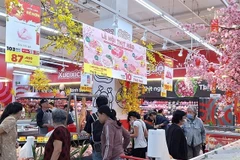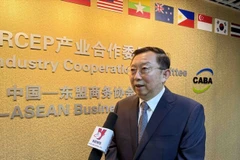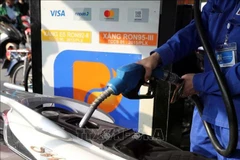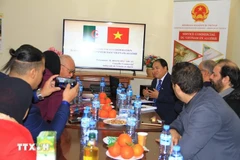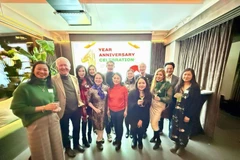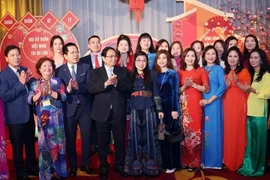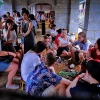HCM City (VNS/VNA) - The Mekong Delta province of An Giang hastargeted shifting from traditional agricultural production, which is heavilydependent on fertilisers and chemicals, to more sustainable production andorganic standards, said a provincial official.
Nguyen Si Lam, Director of the Department of Agriculture and Rural Development,said the province was focusing on environmental protection, emission reductionsand climate change adaptation, and calling for more local and foreigninvestment in green agricultural production.
The province since 2013 has had a Jasmine rice production area under GlobalGAPstandards in Chau Phu district and a bio-safe rice production area in AnPhu district on 400-600 ha per year, with profits increasing forfarmers, he said.
In addition, it has piloted an organic rice-shrimp model on 1ha in An Phudistrict, and has grown high-quality organic rice in Tan Chau town, Lam added.
All of these results have created an important foundation for the area togradually shift from traditional production to safer and organic standards.
Despite this progress, he said the agricultural sector faced a number ofchallenges.
The rice yield is very high, but farmers’ incomes are still modest,and investment in agricultural production has not been effective, withexcessive use of fertilisers and chemicals.
In addition, the quality of agricultural products has not met the expectationsof consumers, who increasingly demand food safety and clean agriculturalproducts. Imported agricultural products are also putting pressure onlocal products.
The province wants, from now to 2025, to develop its strongest products,including 300ha of rice; mangoes with VietGap standards covering 500ha, ofwhich 100ha of mango is expected to be organic; and VietGap-certifiedvegetables on 6,000ha, of which 1,000ha will receive organiccertification.
According to Alan Broughton, Vice President of the Australian OrganicAgriculture Association, Australian agriculture has much to share with An Giangprovince through research and training to ensure safety and efficiency in thesupply chain.
The core of organic agriculture is to improve the health of farmers andconsumers of agricultural products, restore organic soil, and reduce productioncosts.
The most important step is to change farming practices through practicalexperiences and short-term training courses with “hands-on experience” forfarmers. This will help farmers see the benefits of organic agriculture.
The Australian Association will continue to support An Giang province todevelop organic agriculture through technology transfer to bring practicalbenefits to farmers, especially for ethnic women and families.
Tran Anh Thu, Vice Chairman of the An Giang People’s Committee, said he hopedthat Australia would continue to support the province in organic agriculturedevelopment, through short-term training courses for agriculture officials,scientists and farmers.
The first Mekong Delta Forum on Developing Partnerships Between Australia andVietnam for Organic Agriculture Movement is one of four components of a projectto promote partnership between Australia and Vietnam.
The project has four work packages.
The first package is to build capacity for three Australian Awards Scholarship(AAS) Alumni from An Giang University (AGU) in agriculture development inAustralia, provided by Organic Agriculture Association (OAA), NationalAssociation of Sustainable Agriculture Australia (NASAA), Canberra OrganicGrower Society (COGS), Fenner School of Environment & Society, and theAustralian National University.
In the second package, the AAS alumni team from AGU, including Dr Nguyen Van Kien,Nguyen Van Thai, and Le Ngoc Hiep, will develop an organic agriculture researchcentre called the “Mekong Organics Hub” to promote linkages betweenagriculture, nutrition and public health in the Mekong Delta Region.
For the third package, the Hub will partner with the An Giang Department ofAgriculture and Rural Development and An Giang Province People’s Committee toorganise the first Mekong Delta Forum on Developing Partnerships BetweenAustralia and Vietnam for an Organic Agriculture Movement.
The forum aims to share the experiences of organic agriculture research anddevelopment with organic growers, organic agriculture associations, farmextension staffs, local governments, business sectors, and NGOs. It will alsodevelop a partnership for organic industry development in the twocountries.
The fourth package is the piloting of a home-based organic vegetable farmwith female Khmer farmers in An Giang province to promote nutrition andpopulation health outcomes for the communities.
The forum in the province was co-funded by Aus4Skills Small Grants for AAValumni and An Giang People’s Committee’s Department of Agriculture & RuralDevelopment and An Giang University. It aimed to develop partnershipsbetween Australia and Vietnam for Organic Agriculture Movement.
Nearly 200 delegates, including scientists and organic agricultural experts,participated in the forum organised by An Giang province’s People’s Committee.-VNS/VNA



